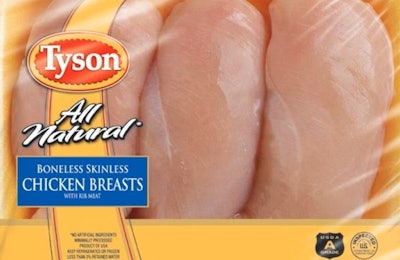
Shareholders for Tyson Foods have proposed that the company’s board of directors commission a third-party audit assessing the effectiveness of the company’s policies and practices to prevent illegal child labor throughout its value chain.
The matter is on the agenda for the company’s annual meeting, set for February 8. The proposal can be accessed among the U.S. Securities and Exchange Commission (SEC) filings listed on the Tyson Foods Investor Relations webpage.
According to the filing, the Tyson board recommend that shareholders vote against the measure.
The proposal
The shareholder proposal not only seeks that the audit be conducted, but also list the findings on the company’s website.
Proponents of the proposal state that the audit should include:
- Evaluation of Tyson policies and practices regarding, but not limited to, slaughter and processing facilities, third-party contractors, suppliers etc. linked to child labor violations.
- Meaningful consultation with workers, suppliers, and other relevant stakeholders to inform appropriate solutions and ensure compliance with federal child labor requirements.
- Recommendations for actions and regular reporting with progress on identified actions. Whereas: Investors remain concerned the illegal use of child labor poses significant financial, reputational, legal, and human rights risks throughout the company’s value chain.
The proposal noted that in March 2023, a U.S. Department of Labor (DOL) investigation found the use of illegal child labor in Tyson’s Arkansas and Tennessee facilities. These children, employed by Tyson contractor Packers Sanitation Services Inc. (PSSI), worked during the night shifts and were exposed to dangerous chemicals and meat processing equipment like back saws and head splitters, a DOL investigation revealed. The investigation found seven children working in Tyson facilities and assessed the penalty at $105,966, the maximum penalty under federal law.
“Despite Tyson’s no tolerance policy for the use of illegal child labor, the company does not disclose information on how its commitment is implemented,” the proposal read.
Those advocating for the audit also noted that 10 states – in which most Tyson Foods has operations -- have introduced bills to roll back child labor protections during the past 2 years. The proponents of the audit said Tyson has not opposed any of the bill, and questioned if that is indicative of a support of those bills.
Tyson Foods board recommendation
The filing revealed that the board recommends that shareholders vote against the shareholder proposal, citing that the company’s existing policies, practices and initiatives already include a robust system of checks and audits designed to prevent underage workers from illegally working in Tyson facilities, and the requested audit would be “duplicative and unnecessary.”
Regarding contractors such as PSSI, Tyson’s board stated that the company expects its suppliers to abide by the standards set forth in the Tyson Foods Supplier Code of Conduct, which includes specific labor and human rights provisions that require contractors to:
- Verify the eligibility of their employees.
- Prohibit inappropriate recruiting practices and fees.
- Ensure no forced labor or child labor is being used or human trafficking is occurring.
- Respect the right of employees to freely associate, organize and bargain collectively.
- Ensure compliance with applicable wage and hour laws.
- Prohibit discrimination, harassment and workplace violence.
- Provide options for employees to report concerns without fear of retaliation.
Tyson Foods Board of Directors consists of the following members: CEO Donnie King, John H. Tyson, Noel White, Kevin M. McNamara, Les R. Baledge, Mike Beebe, Maria Claudia Borras, David J. Bronczek, Mikel A. Durham, Johnathan D. Mariner, Cheryl S. Miller, Jeffrey K. Schomburger and Barbara A. Tyson.















